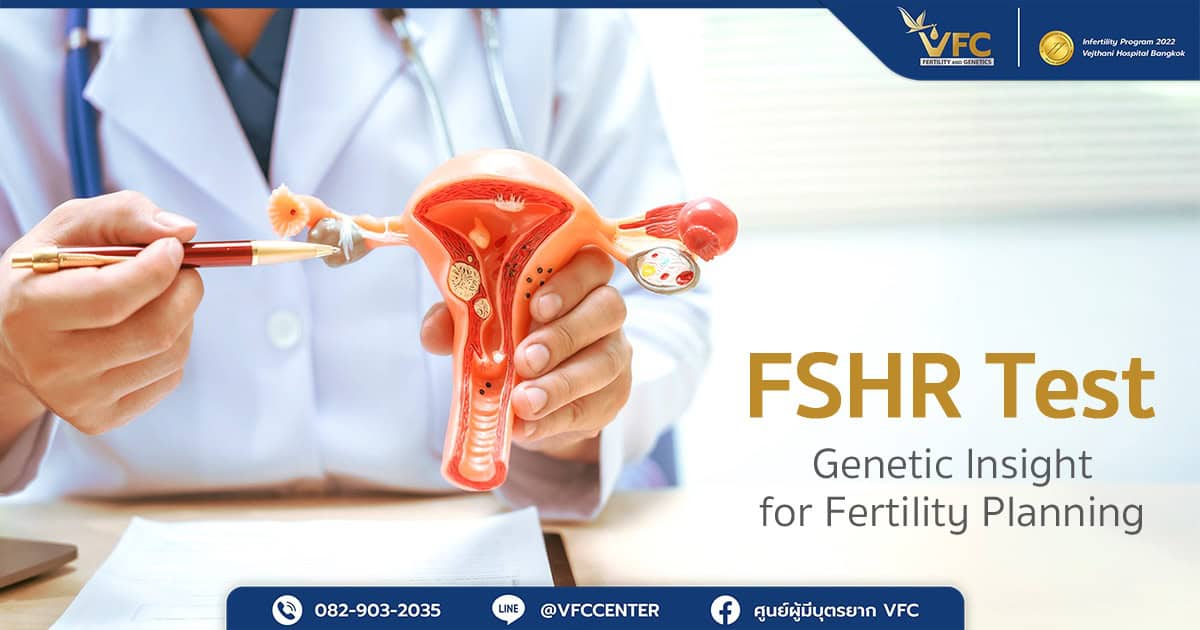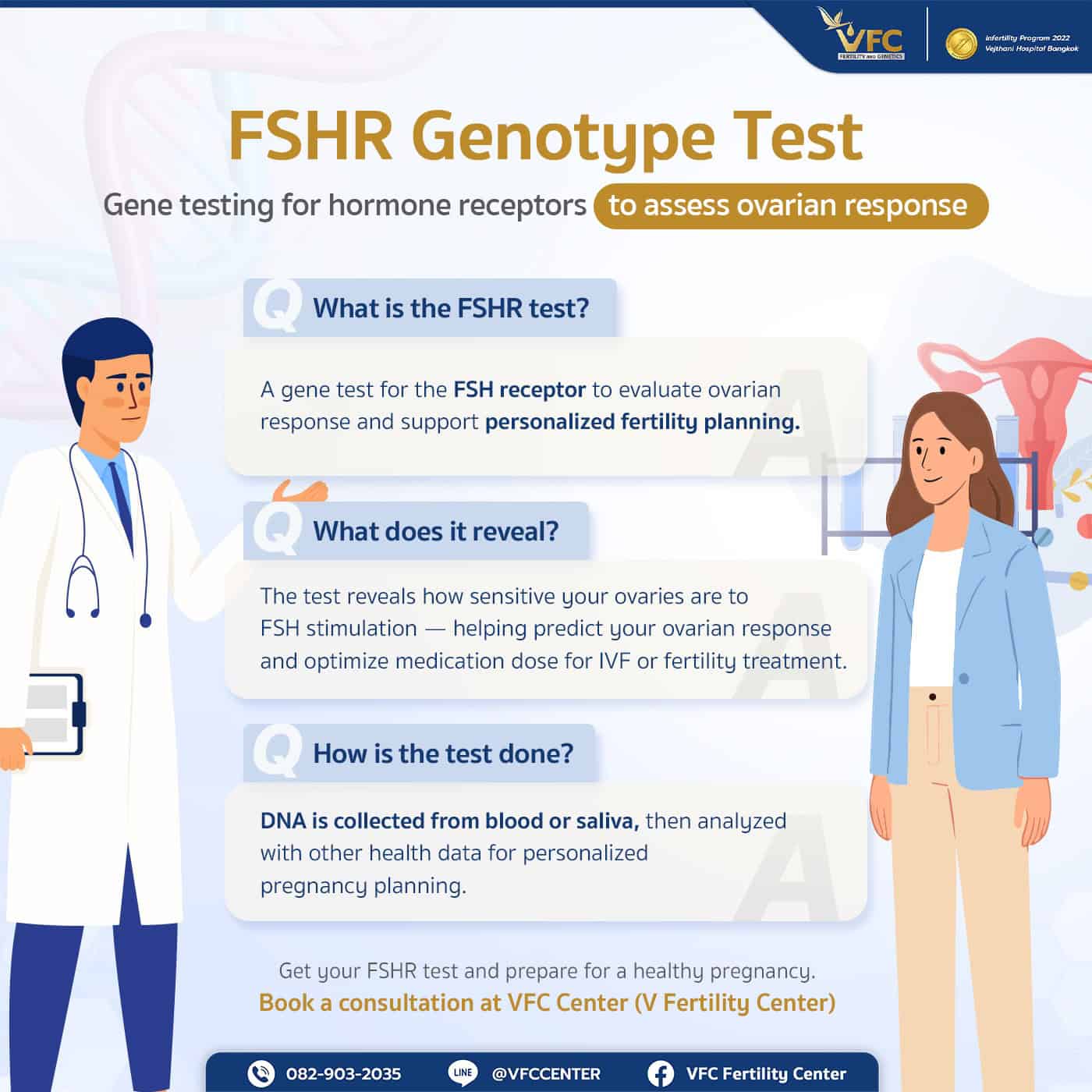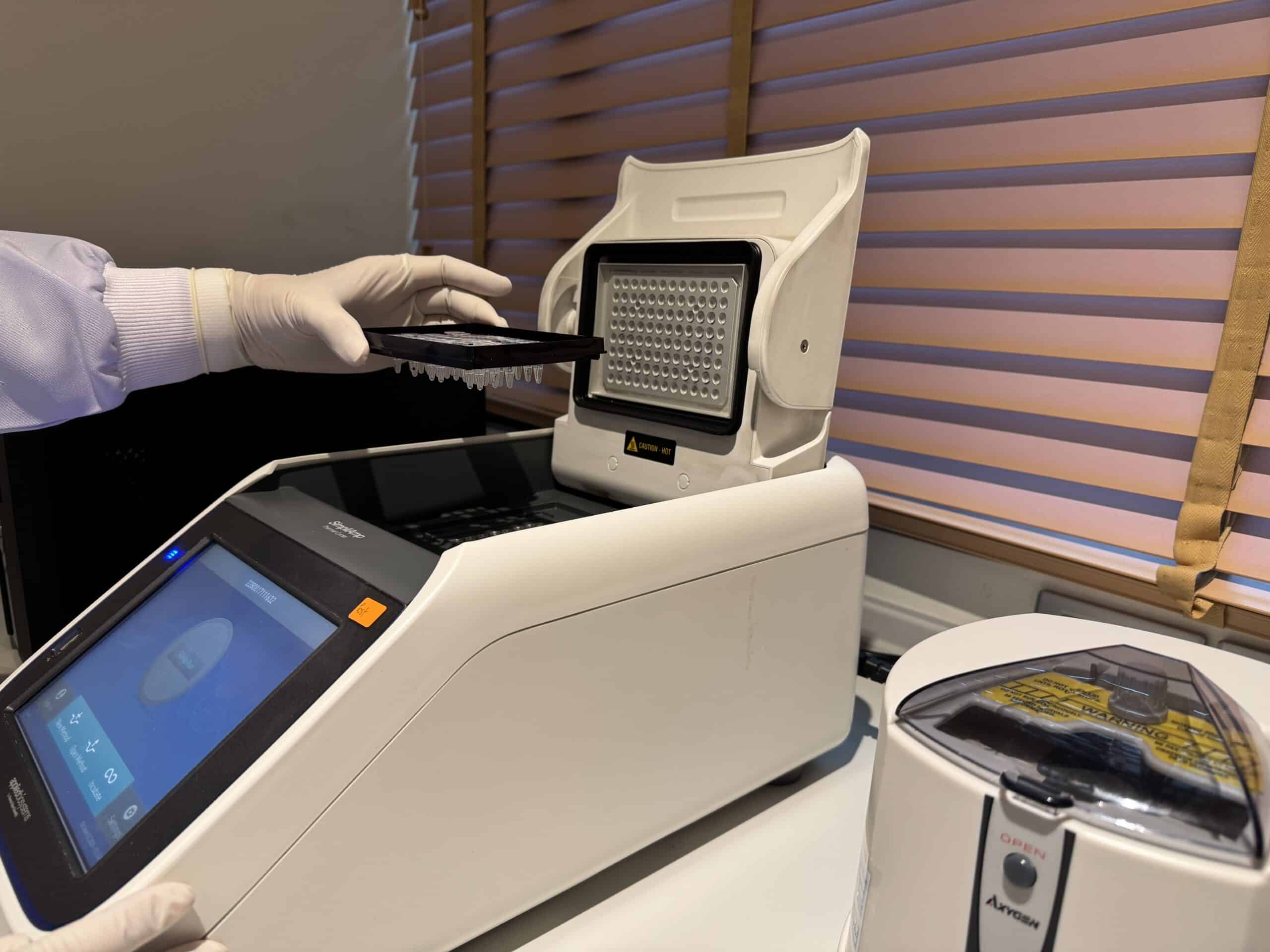
Effective pregnancy planning starts with understanding your ovarian potential—one of the most crucial factors determining the likelihood of conception, whether naturally or through assisted reproductive technology such as IVF.
The Follicle-Stimulating Hormone (FSH) is the key hormone that stimulates follicle growth within the ovaries. However, the ovarian response to FSH varies among women, primarily due to genetic diversity in the FSH receptor (FSHR).
The FSHR test is a type of gene testing that evaluates how sensitive the ovaries are to FSH. This allows fertility specialists to personalize stimulation protocols, improving egg retrieval outcomes and increasing the chance of successful pregnancy from the very first treatment cycle.

What Is the FSHR Genotype Test?
The Follicle-Stimulating Hormone Receptor (FSHR) is a receptor located on ovarian cells that responds to FSH released by the pituitary gland. When FSH binds to FSHR, it signals the ovarian cells to grow and mature into eggs ready for ovulation and fertilization. Each woman has unique FSHR gene variants, which affect how well her ovaries respond to FSH.
The FSHR receptor plays critical roles such as:
- Receives stimulation signals from FSH to promote follicle growth and ovulation readiness.
- Triggers cell division and follicular development that leads to egg maturation and fertilization.
- Influence ovarian sensitivity, as genetic variations determine whether the ovaries respond strongly or weakly to FSH.
The FSHR Genotype Test identifies these receptor gene variants, helping physicians determine if a woman’s ovaries respond to FSH at high, moderate, or low levels. This information is invaluable for tailoring fertility treatments—especially IVF—by minimizing unnecessary hormonal medication and improving stimulation efficiency.
Learn more about the FSHR test with our fertility specialists.
What Does the FSHR Genotype Test Reveal?
The FSHR test provides insights into how your ovaries respond to hormonal stimulation, allowing physicians to create more precise, individualized fertility plans.
Results from this gene testing can help predict your ovarian response and optimize medication dose for IVF or fertility treatment.
1. Ovarian Sensitivity to FSH
The test helps determine how well the ovaries respond to FSH stimulation. This allows doctors to optimize the FSH dosage during IVF cycles, reducing medication risks and improving egg yield.
2. Likelihood of Ovarian Response and Multiple Follicle Development.
Genetic variations in the FSHR gene influence how sensitive the ovaries are to FSH stimulation. This affects the number of follicles that may mature during a cycle, helping clinicians adjust medication dose to optimize egg retrieval and minimize overstimulation risks.
3. Personalized Fertility Planning
Results from the FSHR Genotype Test are analyzed alongside factors such as age and reproductive history. This enables fertility specialists to create highly personalized stimulation and treatment plans—selecting the most suitable FSH type, dosage, and treatment duration.

Who Should Consider the FSHR Genotype Test?
This hormone check and gene-based fertility assessment is beneficial for women in various situations, especially those planning pregnancy or undergoing assisted reproductive treatments:
- Women planning to undergo IVF who wish to assess their ovarian response beforehand.
- Women with poor response or few eggs retrieved in previous stimulation cycles.
- Women over 35 are concerned about declining ovarian quality.
- Women attempting natural conception who want to assess ovarian potential in advance.
- Women with recurrent miscarriage or unexplained infertility, where genetic factors may affect ovarian response.
Book a fertility consultation to plan your pregnancy with precision.
How the FSHR Genotype Test Works
The FSHR test is an advanced gene testing method recommended during pre-pregnancy evaluation. It involves five major steps:
1. Pre-Test Preparation
Consult your fertility specialist to determine the right time for testing. You may need to pause certain fertility medications or hormones before testing. Disclose all medications and medical conditions for accurate results.
2. DNA Sample Collection
A small blood sample is collected safely and painlessly using sterile equipment, then sent to the laboratory for analysis.
3. Gene Analysis
Specialists extract DNA and perform PCR-based genotyping to identify FSHR variants and determine ovarian sensitivity to FSH.
4. Result Interpretation by Fertility Specialist
Once results are available, the fertility doctor explains them in simple terms and advises on the most appropriate fertility stimulation protocol, medication type, and dosage.
5. Integrating Results with Overall Health Assessment
The final step involves combining FSHR results with other fertility indicators such as AMH levels, age, and previous ovarian response. This provides a comprehensive overview for effective and individualized pregnancy planning.
Maximize your chances of conception from the very first step with the FSHR Genotype Test—a precise gene testing method to assess ovarian function and hormonal sensitivity.
At VFC Center (V Fertility Center), our reproductive endocrinologists provide personalized care and cutting-edge fertility treatments to help you achieve a successful pregnancy.
For patients seeking deeper genetic evaluation, we also offer preimplantation genetic testing of embryos to ensure healthy conception and reduce genetic risks.
Article by Dr. Wanakan Singhasena
Contact or Book a Consultation:
VFC Center – V-Fertility Center
Hotline: 082-903-2035
LINE Official: @vfccenter
Frequently Asked Questions (FAQ)
Q: What is the FSHR Genotype Test, and why is it important for fertility planning?
A: It’s a gene testing procedure that evaluates how your ovaries respond to FSH. The information helps doctors design the right stimulation plan for IVF and other fertility treatments.
Q: How does the FSHR test improve ovarian stimulation in IVF?
A: The test identifies how responsive your ovaries are to FSH, allowing for precise medication adjustments and reducing the risk of overstimulation.
Q: When should I take the FSHR Genotype Test?
A: Ideally before IVF or fertility treatment—especially for women over 35 or those with a history of poor ovarian response.
Q: Can the FSHR Genotype Test increase my chances of pregnancy?
A: Yes. By aligning treatment protocols with your genetic profile, the test improves ovarian stimulation efficiency and enhances conception success.

OBSTETRICS AND GYNAECOLOGY-REPRODUCTIVE MEDICINE





No Comments
Sorry, the comment form is closed at this time.